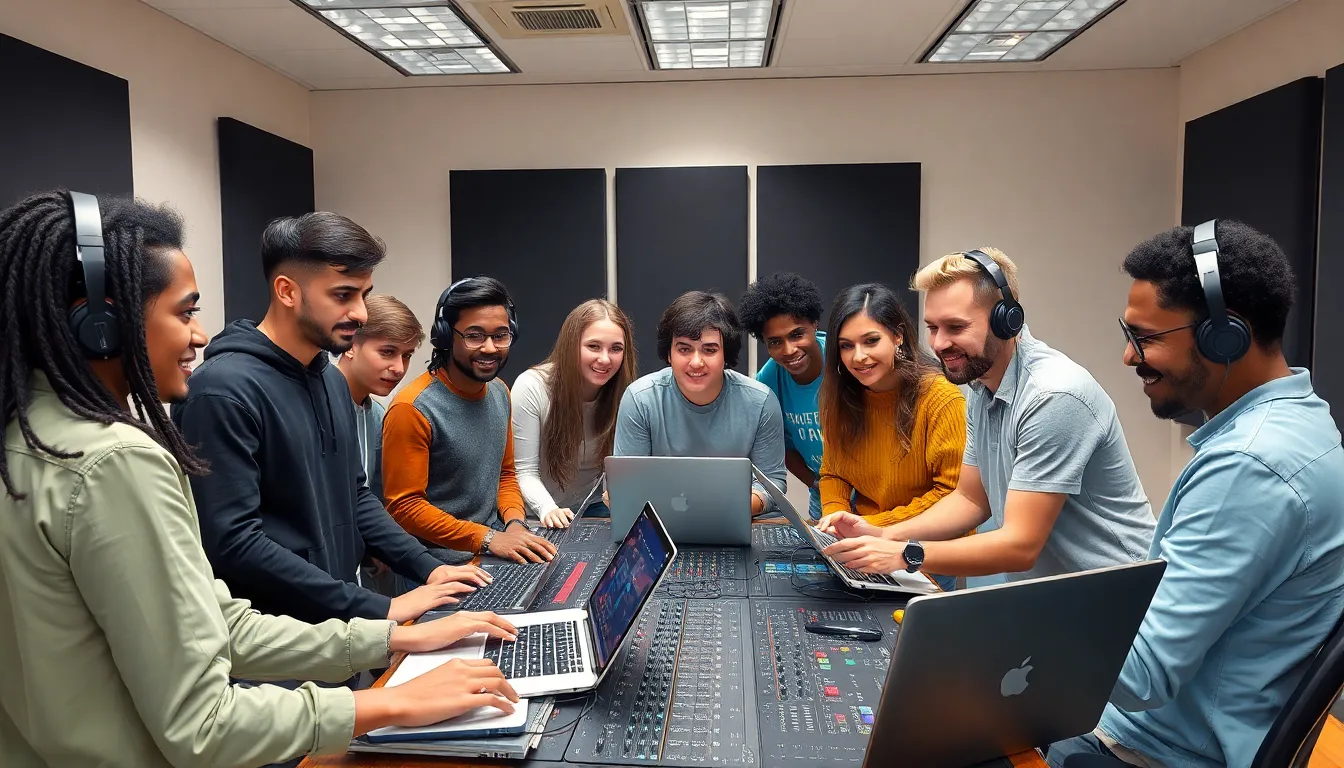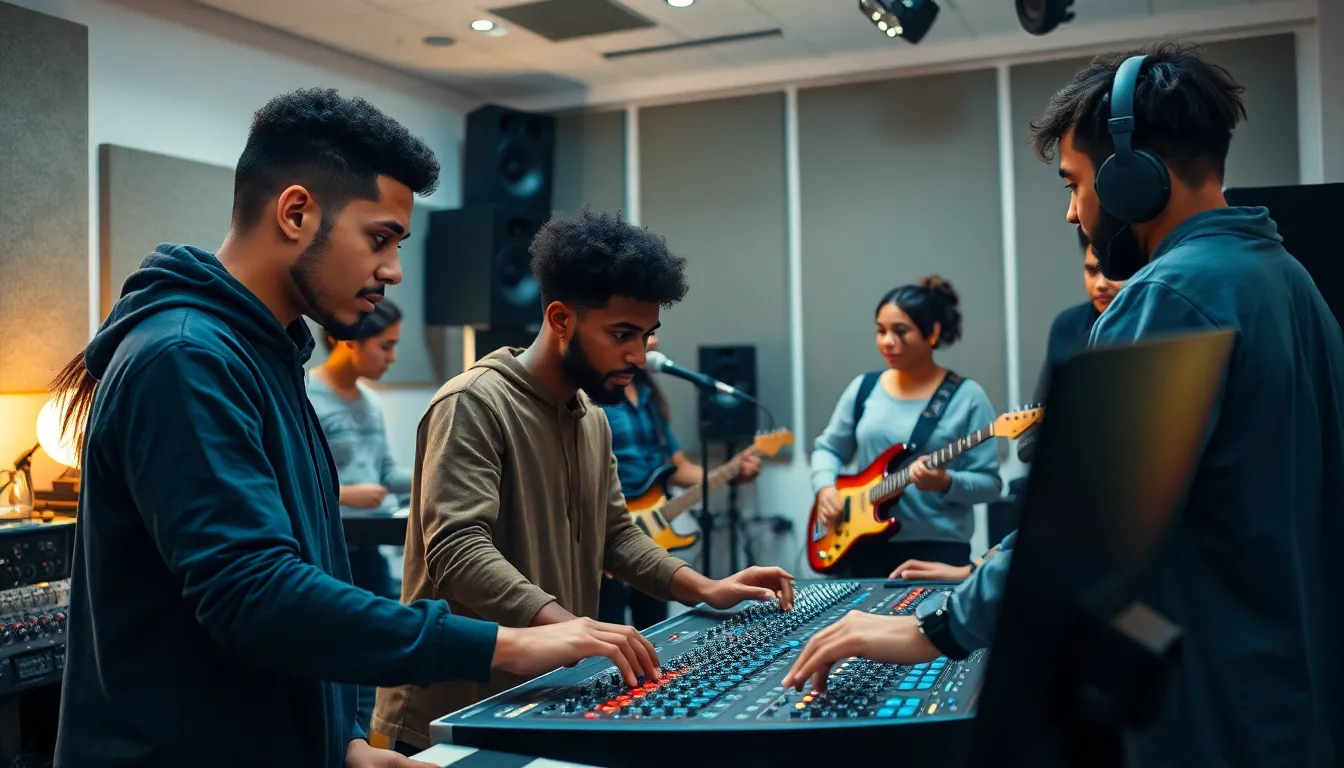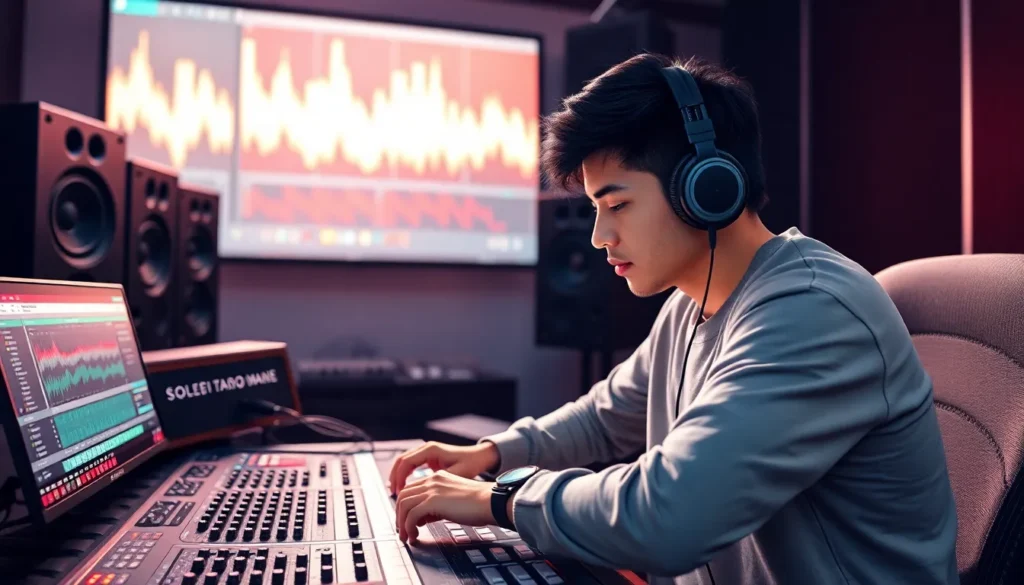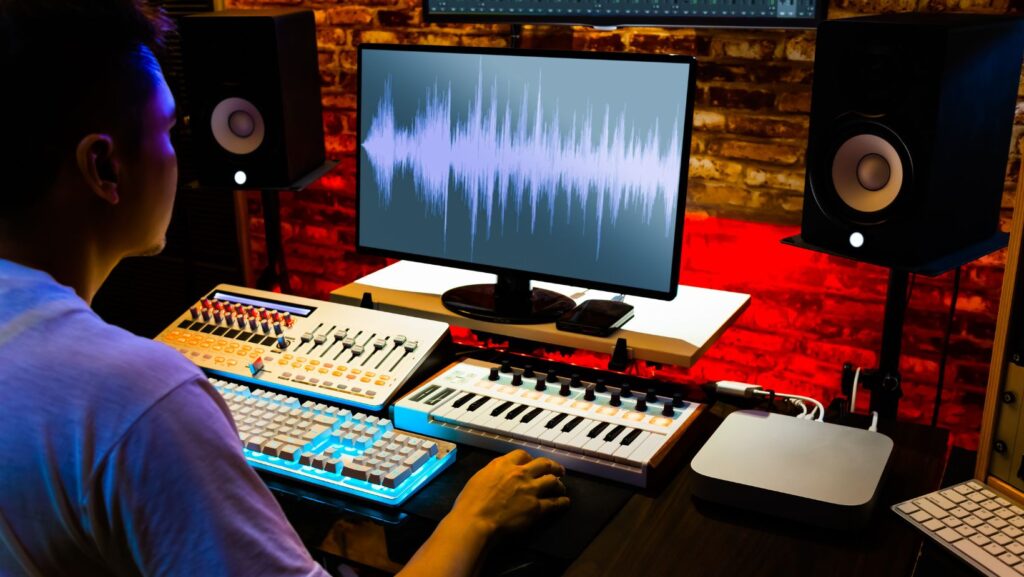In a world where anyone can become a bedroom DJ or a chart-topping producer, music production education stands as the secret sauce that separates the pros from the wannabes. Imagine diving into a realm where creativity meets technology, and every beat you drop could make the world dance. It’s not just about pressing buttons; it’s about mastering the art of sound, and trust us, your future self will thank you for it.
Understanding Music Production Education
Music production education equips individuals with essential skills for a successful career in creating music. This education blends technical knowledge and artistic expression, critical for standing out in a crowded field.
What Is Music Production Education?
Music production education encompasses various disciplines, including sound design, mixing, and mastering. Courses cover software such as Ableton Live, Pro Tools, and FL Studio. Students learn concepts like music theory, arrangement, and audio engineering. Comprehensive programs often include hands-on projects that foster real-world experience. Networking opportunities with industry professionals frequently accompany these courses.
Importance of Music Production Education
Music production education plays a vital role in professional growth. Understanding the intricacies of sound can significantly enhance creativity. Quality production skills set apart professional producers from amateurs, impacting commercial success. Valuable insights into industry standards and trends are often gained through formal education. Pursuing this education increases opportunities, making it easier to collaborate and create connections in the industry. It provides foundational knowledge essential for career advancement.
Types of Music Production Programs

Various music production programs cater to different learning preferences and career goals. These options include certificate programs, degree programs, and online courses.
Certificate Programs
Certificate programs typically focus on practical skills in music production. Many institutions offer these short-term courses, ranging from a few months to a year. Students often learn software applications like Pro Tools and Ableton Live, gaining hands-on experience. Real-world projects form a core part of the curriculum, allowing participants to build a professional portfolio. Certificates often appeal to those seeking quick entry into the industry or enhancing existing skills.
Degree Programs
Degree programs generally provide a comprehensive approach to music production education. These programs often last two to four years and cover a broader spectrum, including music theory, sound design, and audio engineering. Institutions that offer degrees commonly emphasize both technical and artistic aspects. Students engage in collaborative projects and internships to gain experience, which proves vital in the job market. A degree in music production may also open doors to advanced career opportunities within the industry.
Online Courses
Online courses present flexibility, making them a popular choice for aspiring music producers. Many platforms provide access to high-quality instruction from industry professionals. Courses cover various topics, enabling learners to focus on specific areas, such as mixing or mastering. The self-paced format allows participants to balance education with other commitments. Online learning fosters community through forums and discussion groups, connecting students across the globe.
Key Skills Learned in Music Production Education
Music production education cultivates a range of essential skills. Students gain valuable technical abilities, creative insights, and business acumen.
Technical Skills
Mastering software tools like Ableton Live, Pro Tools, and FL Studio becomes crucial. Students learn to record, edit, and mix audio tracks, enhancing their technical expertise. Understanding sound design techniques also plays a significant role in shaping unique audio experiences. Courses often cover aspects of audio engineering, teaching the importance of equipment setup and microphone placement. Real-world projects provide hands-on experience, solidifying these technical skills through practical application. This foundation enables graduates to operate equipment confidently in professional settings.
Creative Skills
Creativity flourishes within music production education. Knowledge of music theory allows students to create compelling arrangements and compositions. Exploring various genres inspires innovative approaches to music creation. Students engage in collaborative projects, exchanging ideas that enhance their artistic expression. This dynamic environment nurtures individual styles while fostering teamwork. Experimentation with sound and effects further develops creative thinking, encouraging producers to push boundaries in their work. Graduates emerge with a heightened ability to craft unique sonic landscapes.
Business Skills
Understanding the music industry remains essential for aspiring producers. Courses often cover marketing strategies, including branding and promotion tactics. Networking opportunities allow students to make connections that prove invaluable in their careers. Knowing how to negotiate contracts and manage budgets also enhances their business acumen. These skills equip graduates to navigate the complexities of the music market confidently. Emphasis on entrepreneurship encourages creativity while ensuring financial viability for their projects. Overall, a solid grasp of both the artistic and business elements of music production contributes to long-term success.
Choosing the Right Music Production Education Path
Selecting an appropriate path for music production education requires careful consideration of various factors. Factors like personal goals, learning styles, and availability of programs play a significant role.
Factors to Consider
Students should evaluate their career aspirations before committing to a program. Assessing individual learning preferences helps identify the most suitable format, whether it’s in-person, online, or hybrid. Duration of the program often influences choice, with shorter certificate programs offering quick immersion into practical skills, while degree offerings provide in-depth knowledge over two to four years. Budget constraints also matter; options range from low-cost online courses to higher tuition for prestigious institutions. Networking opportunities can enhance career prospects, making programs that connect students with industry professionals valuable.
Top Institutions for Music Production Education
Many leading institutions offer exceptional music production programs. Full Sail University provides a range of degrees focused on various aspects of music production, known for its hands-on learning approach. Berklee College of Music stands out for its comprehensive curriculum that blends artistic and technical education. The Los Angeles Film School emphasizes collaboration, offering programs driven by industry needs and technological advances. Additionally, Point Blank Music School, with its global presence, delivers high-quality online courses taught by experienced professionals. These institutions equip students with the knowledge and skills necessary for success in the competitive music industry.
Conclusion
Investing in music production education is a pivotal step for anyone serious about a career in the industry. It not only sharpens technical skills but also fosters creativity and business acumen. By choosing the right program that aligns with personal goals and learning styles, aspiring producers can gain invaluable knowledge and experience.
With a solid foundation in both artistry and technology, they’ll be better prepared to navigate the competitive landscape of music production. This education opens doors to collaboration and networking opportunities essential for long-term success. Embracing this journey can truly set individuals apart in a field where innovation and skill are paramount.



